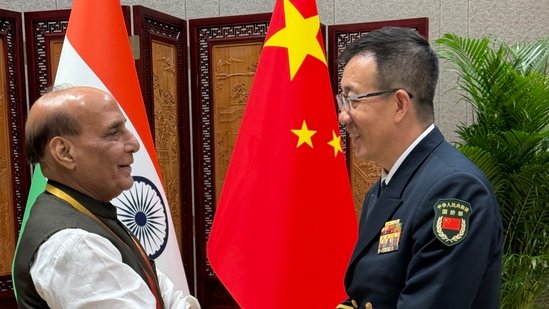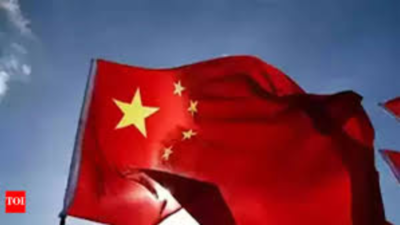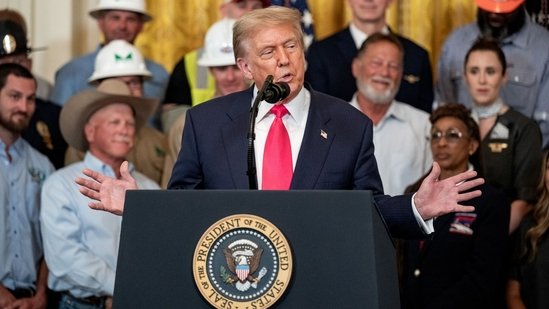China‘s space-based military technology is developing ‘breathtakingly fast’ with US forces at risk of the ‘kill chain’, Washington has warned.
Beijing have been catching up in the arms race to develop missile technology that can be sent from space at a ‘very concerning rate’, the top commander of the US Space Force (USSF) added.
The so-called kill chain – which identifies, tracks and attacks a target – could be used on US and allied forces in the Indo-Pacific as well as ‘over-the-horizon’ precision strikes, General Stephen Whiting told The Telegraph.
The warning comes only a month after Donald Trump unveiled his own plans for a $175 billion ‘Golden Dome’ defence system which he says will protect the US from the world’s most powerful weapons.
The integration of space-tech with China’s army, navy and air force has made them ‘more lethal, more precise and more far-ranging’ – and could take the lead from the US in the space-arms race.
Earlier this year, the USSF said that China had conducted several synchronised satellite manoeuvres in low Earth orbit, also known as ‘dogfighting’.
‘They are practicing tactics, techniques, and procedures to do on-orbit space operations from one satellite to another,’ General Michael Guetlein, the Deputy Chief of US Space Operations at the USSF, said.
He added: ‘There used to be a significant capability gap between the United States and our adversaries, driven by our technological advantage.

China ‘s space-based military technology is developing ‘breathtakingly fast’ with US forces at risk of the ‘kill chain’, Washington has warned (pictured: the Chinese People’s Liberation Army Rocket Force launching an intercontinental ballistic missile carrying a dummy warhead into the Pacific Ocean)

The integration of space-tech with China’s army, navy and air force has made them ‘more lethal, more precise and more far-ranging’, warned General Stephen Whiting (pictured)

The warning comes only a month after Donald Trump unveiled his own plans for a $175 billion ‘Golden Dome’ defence system which he says will protect the US from the world’s most powerful weapons
‘That gap, once massive, has narrowed considerably.
‘If we don’t change our approach to space operations, we risk seeing that gap reverse, putting us at a disadvantage.’
China has more than 500 satellites capable of intelligence, surveillance and reconnaissance (ISR), with 67 sent up in the last year alone, the USSF said in 2024.
The ‘space enabled services’ are broken down into three units – a cyberspace army, an aerospace force, and an information support arm.
While America have around 8,000 satellites in space compared to China’s 1,000 in total, Chinese scientists have also recently developed what is considered the world’s most powerful satellite tracking camera.
The technology is able to take pictures with millimetre level accuracy more than 60 miles away.
Chinese satellites are also working towards counter-weapons development that would see other satellites jammed, destroyed or ‘spoofed’ – which is where the GPS receiver is misled or manipulated.
Exerts have previously warned that the US is underprepared for such developments, with the first test done in 2008 where a satellite in space was shot down with a missile on the ground.

China has more than 500 satellites capable of intelligence, surveillance and reconnaissance (ISR), with 67 sent up in the last year alone (pictured: Long March-2F Y15 carrier rocket carrying the Shenzhou-15 spacecraft with three astronauts aboard)

Trump’s Golden Dome appears to draw inspiration from Israel’s ‘Iron Dome,’ which protects the country against attacks by shooting missiles out of the sky

But the latest developments could redirect drones, disable munitions or missiles and shut down crucial infrastructures.
China’s long-range weapons that strike with precision ‘depend on space’ and is how Beijing ‘closes its kill chain’, the USSF commander of the Indo-Pacific region, Gen Anthony Mastalir, has previously warned.
Trump’s Golden Dome proposal was ‘long overdue’ and ‘absolutely necessary’ amid growing threats from China, North Korea and Russia, experts said at the time.
But Beijing warned that the plan to put US weapons into the earth’s orbit for the first time ‘heightens the risk of space becoming a battlefield, fuels an arms race, and undermines international security.’
Meanwhile Moscow called for Washington to make contact regarding the programme – to which Trump said he would do so ‘at the right time’.
Following talks between the allies earlier this month, Beijing and Moscow released a joint statement condemning Washington’s plans as being ‘deeply destabilising’ and turning space into ‘an arena for armed confrontation.’
An unclassified DIA report released in May stated that China and Russia ‘are developing an array of novel delivery systems,’ to exploit gaps in US defences, while traditional ballistic missiles are expected to remain the primary threat to American soil.








